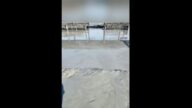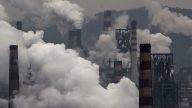【新唐人2012年12月06日讯】长期关注中国环境保护的两名中国农民,日前,选择在《纽约时报》刊登广告,他们除了恭贺刚刚上任的中共七名最高领导人,并且提醒他们,在环境保护方面必须做到“言行一致”。
11月30号,《纽约时报》A叠第24版新闻版,刊登了中国环保志愿者陈法庆和吴立红两人提出的中、英文环保公益广告。他们在广告词中祝贺七名中共中央政治局常委走马上任,并希望新的中共最高领导人要重视环境保护方面的工作。
在此之前,陈法庆和吴立红两人凑了超过十万元人民币的广告费,想在中共喉舌《人民日报》刊登这则广告。但《人民日报》广告负责人告诉陈法庆,这是政治广告,太敏感,不敢登。
陈法庆接受《新唐人》采访时表示,由于几十年来,中国的环境状况恶化,导致群体事件增多。上个月,中共十八大闭幕,当局把生态建设写入《中国共产党党章》,但是,陈法庆和吴立红还是希望中共中央领导,在保护环境方面能够讲到做到。
中国环保志愿者 陈法庆:“我和吴立红先生都认识到,我们现在这个环境的状况是非常糟糕,总的…政府在治理环境方面它是讲的多做的少,其实它没有监管好我们的生存环境,没有治理好。我们现在做这个广告,就是希望中国新的领导人保护环境方面,确实给我们这13亿的国人,有一个真正的美好家园。这就是我们做广告的本意。”
45岁的陈法庆是浙江省杭州市余杭区人,他自1996年开始关注环境保护,至今已经16年,曾经因为当地矿群的粉尘和噪音污染,以及水源保护区污染,而将浙江省杭州市余杭区环保局、 浙江省政府、和省环保局告上法庭;而44岁的吴立红,是江苏宜兴人,他自1998年开始关注太湖的水资源保护。吴立红和妻子许洁华因举报太湖周边的化工企业排放废水,先后失去工作,并且坐冤狱3年,在监狱里遭到“酷刑折磨”。
陈法庆指出,中国的环境污染,包括水污染、土壤污染、空气污染,还有温室气体的排放,仍然严重。
近年来,随着化工产业的发展,大陆很多地方出现了重金属污染。从陕西凤翔铅污染、湖南浏阳镉中毒、山东临沂砷污染、云南曲靖铬污染,再到柳州的镉浓度超 标。污染的主要是土壤和饮用水。一份7万人25年健康记录的抽样调查显示,从1965年到2005年,中国人罹患骨癌、骨痛的病人数呈上升趋势。
陈法庆:“由于环境的污染,在保护环境方面,我们上到中央政府,下到地方政府,一天到晚的说要保护好我们的环境,治理环境污染,建设良好的生态环境。现实是讲的好,环境污染现实当中还是…确实这个污染并未好转。而且有些地方还有恶化的趋势。”
今年6月,四川省甚邡市民众因当地化工厂兴建“钼铜项目”,而引发大规模群体抗议事件;接下来的10月下旬,浙江省宁波市镇海区居民,也因为抗议中石化PX(对二甲苯)污染项目落户当地,集体到区政府示威。
陈法庆和吴立红两人,在关注中国环境保护的十几年过程中,亲身体会到:“中国环保法律、法规的欠缺,是环境污染的根源。”
据报导,之前,陈法庆已利用自己经营建筑石料小生意赚来的钱,拿出近百万元在《人民日报》、《南方周末》、墨西哥《千年报》、英国《经济学人》杂志(全球版)、美国《华尔街日报》(全球版)等国内外媒体刊登中、英文公益广告。
中国环保志愿者吴立红:“我们两个共同做这个广告,他也是辛辛苦苦省吃俭用的钱拿出来的,并不是什么富翁,很辛苦的。”
可是,目前,他们找不到可以刊登他们广告的中国传媒。
采访/梁欣 编辑/唐睿 后制/黎安安
In China, Environmental Protection Ad is a Political Ad
Two Chinese peasants recently published an
environmental protection ad in the New York Times.
The ad congratulates the new top seven leaders of
the Chinese Communist Party (CCP).
Moreover, it reminds them to “live up to” the
regime’s words in environmental protection.
On Nov. 30, the New York Times published an environmental
protection ad in Chinese and English languages.
The advertisers are Chen Faqing and Wu Lihong,
two Chinese volunteers on environmental protection.
In the ad, they congratulated the election of seven of the
new CCP leaders, and called on them to prioritize environmental protection work.
Chen Faqing and Wu Lihong had originally intended to
publish this ad in the People’s Daily, a mouthpiece of the CCP.
Yet, the newspaper’s Ad Section chief told Chen that
it is classified as a political ad, too sensitive to be published.
Chen Faqing says that over the decades,
China’s environment has deteriorated.
The situation has aroused numerous nationwide mass protests.
At the recent 18th Party Congress, the CCP authorities
integrated building ecological construction into its Party Constitution.
However, both Chen and Wu hoped that the
regime could live up to its words in reality.
Chen Faqing: “Both Mr. Wu and I know that the real
situation is terribly bad.
The government offers only lip services on combating
environmental degradation, but it failed in practice.
We do hope this ad would help voice our wishes that
China’s new leaders would create a pleasant living
environment for us 1.3 billion Chinese people.”
Chen Faqing, 45, is from Hangzhou, Zhejiang Province.
Chen had begun to focus on environmental
protection issues since 1996.
In the past 16 years, Chen Faqing sued local environmental
protection authorities and the provincial authorities for
local mining dust and noise pollution,
and water source pollution.
Wu Lihong, 44, is a citizen in Yixing, Jiangsu Province.
Since 1998, Wu started to get involved in protection of
Lake Tai, a large lake in the Yangtze Delta plain.
Wu and his wife lost their jobs for informing against chemical
plants for their discharge of waste water into Lake Tai.
Wu was even sentenced to three years in jail,
where he underwent several tortures.
Chen Faqing reveals that China is beset by severe pollution
in water, soil, air quality, plus greenhouse gas pollution.
In recent years, the chemical industry’s rapid growth has
created massive heavy metal pollution across China.
The reported cases include lead pollutions in Fengxiang,
Shaanxi; cadmium poisoning in Liuyang, Hunan;
arsenic contamination in Linyi, Shandong;
chromium pollution in Qujing,Yunnan;
and excessive cadmium found in Liuzhou, Guangxi.
In Chian, soil and drinking water pollution stands atop.
A survey with a sample size of 70,000 residents shows
an upward trend of Chinese people suffering from
bone cancer and bone pain, in a period from 1965 to 2005.
Chen Faqing: “All day long, the authorities claim
how well they are protecting our environment,
fighting environmental pollution and building a
pleasant ecological environment. That’s good talking,
but in reality, pollution still remains unchecked
in our daily life, and has even worsened in some areas.”
In June, a large-scale mass protest occurred
in Shifang, Sichuan Province.
The residents opposed the local authorities to build
a molybdenum copper plant.
In October, Ningbo citizens demonstrated in front of
city hall, protesting against a local paraxylene (PX) project.
Involved in envionmental protection for over a decade,
both Chen Faqing and Wu Lihong have discerned a fact.
That is, “Lack of environmental laws and regulations is
the root cause of environmental pollution in China."
Over the years, Chen Faqing has reportedly taken out nearly
1 million Yen, earned from his building materials business,
to publish environmental protection ads.
The public service ads were displayed in the People’s Daily,
the Southern Weekend, Mexican newspaper Milenio,
UK’s Economist, and in the Wall Street Journal, etc.
Wu Lihong: “He saves money from his life expenses to
publish this ad. He’s not a rich man but has lived very frugally.”
So far in China, Chen and Wu haven’t yet found media
that can publish their public service ad.































